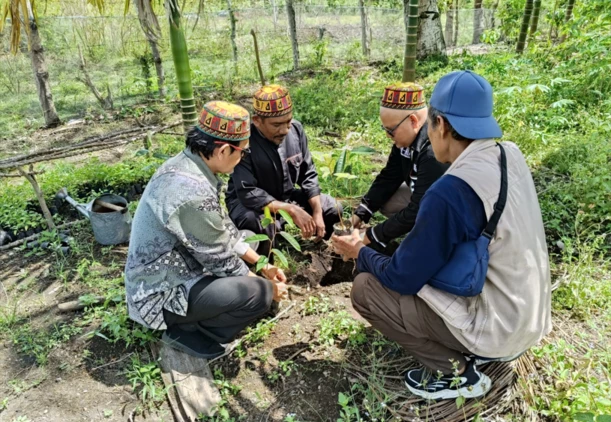
Southeast Asia is home to some of the world’s largest and most biodiverse tropical rainforests, including those found in Thailand. These ecosystems play a vital role in regulating the global climate, supporting thousands of plant and animal species, and providing essential resources for millions of Thais.
Indigenous and rural communities across the country rely heavily on these forests for food, water, cultural identity, and sustainable livelihoods. However, these critical landscapes are increasingly under threat due to deforestation, illegal logging, mining, and agricultural expansion.
According to Global Forest Watch, between 2002 and 2023, the world lost approximately 76.3 million hectares (476.875 million rai) of tropical wet primary forest, resulting in a 7.4% decline in global forest cover during that period. Thailand accounted for about 136,000 hectares of this loss (850,000 rai), representing 5.4% of its total tree cover loss in the same period. This level of degradation presents serious risks to the country’s biodiversity, water resources, and climate resilience.
One of the efforts to restore threatened forests is through collaboration between coalitions and local communities. This collaboration aims not only to reduce deforestation rates but also to promote long-term sustainability that is crucial for ecosystems and to improve the well-being of local communities.
Thailand’s contribution to collaborative climate action is also showcased thoroughly through the establishment and, subsequently, the evolution of RECOFTC (The Centre for People and Forests). Initially a training hub in Thailand, which was established in 1987, the centre now has country-specific programs in seven countries, including Indonesia, Cambodia, Vietnam, and Nepal, establishing strong leadership with governments and grassroots groups.

Indigenous Community Collaboration
One of the initiatives in Indonesia is the coalition between Aliansi Kolibri, a network of civil society organisations, and Jaringan Komunitas Masyarakat Adat (JKMA). This program focuses on facilitating forest restoration efforts through funding, training, and strengthening the capacity of local communities.
In this collaboration, Muhammad Nasir, a local leader known as Imeum Mukim in Mukim Paloh, Pidie Regency, Aceh, plays a crucial role. The 65-year-old man is not only a traditional leader but also an activist committed to preserving the forest. For Nasir, the forest is more than just a source of livelihood for the indigenous people; it also symbolises the deep connection between him, his community, and their ancestors.
In 1987, land was cleared for palm oil plantations around the indigenous forest area. Nasir did not expect that, at the same time, his ancestral forest, covering 2,981 hectares (18,631.25 rai) and long regarded as sacred and a primary source of livelihood for the community, was also designated as an industrial plantation forest. 30 per cent of the forest area was protected by the community as a conservation zone for conducting traditional ceremonies and preserving the graves of their ancestors. Several water springs within the forest are also crucial for the community's vital needs. Meanwhile, 60 per cent of the forest was utilised for farming, including betel leaves, cocoa, and various fruits.

Determined to protect his ancestral heritage and the customary rights of his community, Nasir has prepared himself for a long and challenging journey. In 2012, the Mukim Paloh community, led by Muhammad Nasir, sought assistance from JKMA to provide training on safeguarding their customary rights over their forests. Mukim Paloh consists of 12 villages under the jurisdiction of Padang Tiji Regency.
“Preserving customary forests isn’t just about protecting the trees; it’s about safeguarding our culture, traditions, and rights as an indigenous people,” said Nasir.
The training covered various aspects, including customary forest management, institutional strengthening, participatory mapping, legal capacity building, and climate change issues. Armed with this newfound knowledge, Nasir became even more determined to fight for his community’s rights.
Under his leadership, Nasir became a crucial link between the local community and the government. He actively mapped territories, established customary regulations, and tirelessly advocated for the recognition of customary forests. Supported by JKMA, Nasir often stood at the forefront of the struggle, directly engaging with policymakers.
Currently, Nasir leads training initiatives focused on economic utilisation and land protection—an effort that reflects his unwavering commitment not only to preserving the hard-won status of Mukim Paloh’s customary forests but also to empowering the local community. His dedication to protecting ancestral heritage is evident in his relentless fight for the recognition of Mukim Paloh’s customary forest status. Nasir successfully guided the community in establishing customary regulations and mapping their customary forest territories. With support from JKMA, he has carried out intensive advocacy efforts with policymakers, ensuring that the customary rights of Mukim Paloh’s people over their ancestral forests are safeguarded.
The recognition of Mukim Paloh’s customary forest was officially realised with the issuance of a Decree (SK) signed by the Minister of Environment and Forestry (KLHK) on September 7, 2023, affirming its status. This decree was later presented directly by President Joko Widodo on September 18, 2023, at Gelora Bung Karno (GBK) in Jakarta, marking a significant milestone for the indigenous people of Mukim Paloh in their efforts to protect and preserve their customary forest.
This collaboration is not the only innovation being implemented. Aliansi Kolibri has also restored 22 hectares (137.5 rai) of degraded forest across six districts, involving more than six local organisations. Additionally, this community-based restoration model has sparked greater interest among local communities in planting native species, which also contributes to food security. A total of 2,584 seedlings have been planted to enhance food resilience, with an expected harvest time of at least 4-5 years after planting. The cultivated crops include avocado, durian, guava, oranges, cocoa, coconut, mango, pineapple, and many more.
"We hope the community-based restoration model developed by Aliansi Kolibri can serve as an example for other Southeast Asian countries to involve local communities so they too can directly benefit from these initiatives," said Saharuddin, Secretary of Aliansi Kolibri.



